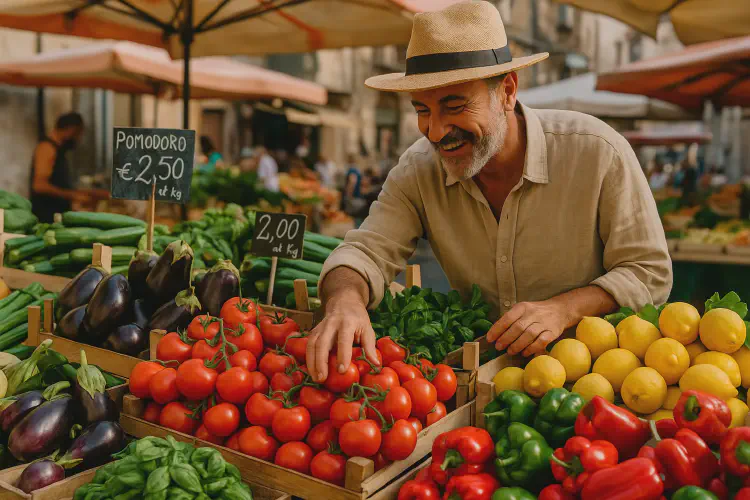Sustainable Sicilian food choices
Sicily’s cuisine is inseparable from its land and sea — and making sustainable food choices helps protect both. By eating local, seasonal, and responsibly sourced food, travelers can enjoy the island’s flavors while supporting small producers and safeguarding its ecosystems.
- Visit Sicily
- 3 min read

Sustainable Sicilian Food Choices — Taste Responsibly, Travel Consciously
🌿 Overview
Sicilian food has always been rooted in simplicity, seasonality, and respect for nature. From market produce to olive oil and seafood, sustainability here means reconnecting with traditional farming and fishing methods that honor the environment. Choosing wisely lets you experience Sicily’s true taste while reducing your footprint.
🥦 1. Eat Seasonal and Local
- Sicily’s fertile soil and sunny climate yield an abundance of seasonal produce year-round.
- Spring: artichokes, fava beans, peas, wild asparagus.
- Summer: tomatoes, eggplants, zucchini, melons, lemons.
- Autumn: mushrooms, grapes, prickly pears, chestnuts.
- Winter: citrus fruits, broccoli, and fennel.
Tip: Visit mercati contadini (farmers’ markets) in Palermo, Catania, and Syracuse for the freshest finds.
🐟 2. Choose Sustainable Seafood
- Sicily’s seas are rich, but overfishing is a growing concern.
- Favor fish caught by small-scale local fishermen using traditional methods.
- Good choices include:
- Sardines and anchovies — abundant and central to Sicilian cuisine.
- Swordfish — only if labeled seasonal and locally caught (avoid juvenile or imported ones).
- Octopus, mackerel, and cuttlefish — low-impact species.
- Avoid endangered species like bluefin tuna or undersized shellfish.
Look for: Pesce locale or certifications from Marevivo and Friend of the Sea.
🌾 3. Support Organic and Slow Food Producers
- Sicily is home to hundreds of organic farms and Slow Food Presidia protecting rare ingredients.
- Notable Presidia include:
- Noto almonds 🥜
- Pantelleria capers 🌿
- Nebrodi black pig 🐖
- Modica chocolate 🍫
- Eolian honey 🍯
- Buying directly from these producers sustains biodiversity and local farming traditions.
Tip: Many agriturismi sell organic olive oil, wine, or preserves — perfect ethical souvenirs.
🍷 4. Drink Local — Sustainable Wine and Water Choices
- Sicily’s vineyards lead Italy in organic and biodynamic winemaking.
- Etna DOC, Menfi, and Marsala regions produce eco-certified wines.
- Many wineries use solar panels, composting, and minimal-intervention techniques.
- Skip bottled water — tap water is safe and refillable bottles help reduce plastic waste.
🍞 5. Dine at Sustainable and Family-Run Restaurants
- Look for Slow Food Osterias or small trattorias that cook with local produce.
- Many use traditional recipes that naturally minimize waste.
- Ask if ingredients come from nearby farms or fisheries.
- Avoid chain restaurants or menus offering non-local seafood and imported produce.
Try:
- Caponata (seasonal eggplant stew)
- Pasta con le sarde (pasta with sardines and wild fennel)
- Panelle (chickpea fritters)
🍊 6. Reduce Food Waste and Plastic Use
- Order only what you can finish — Sicilian portions are generous!
- Bring a reusable water bottle and cutlery for picnics.
- If taking leftovers, ask for a porta via (takeaway container) rather than disposable packaging.
- Avoid single-use plastics — most cafés welcome reusable cups.
🧀 7. Visit Farms, Wineries, and Food Cooperatives
- Many farms and cooperatives open their doors for tastings and tours.
- Cheese farms in Ragusa produce caciocavallo and ricotta using centuries-old techniques.
- Olive groves in Noto and Trapani offer harvest experiences.
- Wine estates near Etna and Marsala combine sustainability with education.
These visits foster a deeper appreciation for Sicilian craftsmanship and sustainable agriculture.
🌍 8. Be Mindful of Imported or Industrial Foods
- Avoid products that travel long distances or rely on heavy packaging.
- Choose Sicilian-grown grains, legumes, and olive oil instead of imported brands.
- Skip out-of-season fruits that require high water or energy consumption.
🧭 Summary
Eating sustainably in Sicily is not a sacrifice — it’s a return to authenticity. Every choice, from a plate of pasta con le sarde to a glass of organic Nero d’Avola, supports local families, biodiversity, and cultural heritage. Savor the island’s flavors with awareness, and you’ll leave not just nourished but connected to Sicily’s living land and sea.